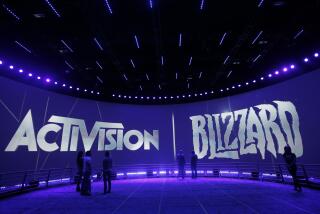Is a Call of Duty settlement coming?
Could a Call of Duty settlement be at hand?
Key pre-trial motions in the high-stakes lawsuit involving Activision Blizzard Inc.’s Call of Duty game franchise abruptly ceased Tuesday morning, prompting speculation as to whether such talks are underway.
The Santa Monica game publisher is being sued by two game developers, Jason West and Vincent Zampella, who headed the studio that created the company’s multibillion-dollar Call of Duty game series. West and Zampella allege that Activision fired them in March 2010 to avoid paying them hundreds of millions of dollars in bonuses and royalties. Activision also faces a related lawsuit from 40 other developers who had worked for Activision under West and Zampella.
Though the one-day recess ordered by Superior Court Judge Elihu Berle could have been prompted by any number of issues, there is a high probability of both sides trying to come to a last-minute understanding, three days before trial was set to begin, said Stephen Smith, a partner with Greenberg Glusker Fields Claman & Machtinger.
“The most common time for cases to settle is right now, on the eve of trial,” said Smith, who specializes in video game law and contract litigation, and went up against Activision in a similar case in 2005. “That’s because there’s a two-fold risk of going to trial.”
The first is that either party could lose in a trial, regardless of their legal merits. Secondly, a trial could expose embarrassing details that could damage their reputation, Smith said.
That’s already happened to some extent. As the case nears trial, Berle has started to unseal documents that would have eventually been made public in a trial. Among those documents were private emails and details of confidential contract terms. Activision, for example, petitioned Berle to reseal one such document, a contract it had signed with Bungie Inc. to develop four games, minutes after it was published by The Times.
“The one thing that Activision does not want to hurt in this trial is the Call of Duty franchise,” Smith said. “Companies don’t like risking their most valuable properties in a legal fight -- either by having embarrassing things come out during trial or by losing.”
Hence, the second reason for settling before a case hits a jury -- the possibility of an adverse ruling. Once the trial begins, the outcome becomes as unpredictable as the people who make up the jury.
“Any lawyer who tells you they’re going to win a jury trial is spinning,” Smith said.
With settlement talks, the parties at least maintain a measure of control over the outcome, he said.
There are also reasons against settling, Smith pointed out.
“Companies may not want to settle because they want to maintain a reputation for not bending to litigation,” Smith said. “Activision is a strong and aggressive company that’s not afraid of litigation.”
Smith has had first-hand experience with Activision’s legal department. In 2005, he represented a group of independent developers called Spark Unlimited who sued Activision for breach of contract on an agreement to develop Call of Duty: Finest Hour, the second game in the Call of Duty series. That case settled in March 2007. Terms were not disclosed.
RELATED:
Call of Duty hearing postponed at last second
Infinity Ward “bonus pool” close to half a billion dollars
Activision and EA settle; main Call of Duty case moves toward trial
More to Read
From the Oscars to the Emmys.
Get the Envelope newsletter for exclusive awards season coverage, behind-the-scenes stories from the Envelope podcast and columnist Glenn Whipp’s must-read analysis.
You may occasionally receive promotional content from the Los Angeles Times.










